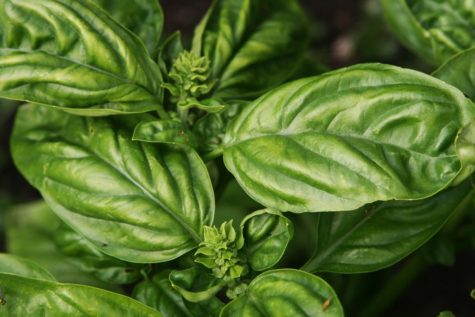- Ruler: Mars
- Element: Fire
- Type: Herb
- Magickal Form: Fresh or dried, Essential oil
- Deities: Vishnu, Lakshmi, Erzuli
- Basic Powers: Purification, Protection, Exorcism, Love
A versatile herb, basil leaves can be used for love, protection, or to attract wealth. Burned in an incense with rose petals, basil helps to restore peace in a relationship. Add to exorcism and protection incenses. Strew your floor with the leaves to dispel discord. Use it in the bath or ingest it in a Philter to restore the vitality of your aura.
Put some basil in your wallet and you will attract money, success and prosperity. Added to an Herbal Amulet it is carried to overcome obstacles to prosperity.
When it was first introduced to England, it was not eaten, but used to provide peace of mind and freedom from pain.
Dried Basil can be lightly sprinkled about the floor and swept out the back door as a purifying floor sweep, because “evil can’t stay where Basil has been.”
To attract love and money, bring the magick of Basil into your home.
- Grow basil in your garden and around the house.
- Place pots of fresh basil by your front entrance and around the perimeter of your home.
- Cook with it, and incorporate it into spell work by placing it in a vase on your altar.
- Place fresh basil in a vase in a prominent spot in your kitchen, replacing it weekly or as soon as it starts to spoil.
In certain central regions of Mexico, basil is used to draw fortune by hanging the plant in the door or window of the shop. The plant’s growth reflects the wealth of the business, showing how dutifully the owner cares for his shop and the herb.
For happiness and peace in the family, soak dried Basil in water for three days. Strain and sprinkle the water at your doorstep to bring money and success, drive away evil, and have a happy family.
A lust herb, basil’s powerful aroma calls forth the sexual energy; eat it to invigorate the sexual appetite. Basil can also be burned to increase sensual pleasures. Place the dried leaves under a bed to reawaken the sex drive in a relationship. In Romania if a young lady offers a young man a sprig of basil, and he accepts, they are officially engaged. In Italy, basil is thought of as a sign of love.
- Eat basil on a Tuesday to summon physical strength or to prepare for battle.
- Consume on a Wednesday to open channels of communication.
Basil belongs to Maitresse Ezili Freda Dahomey, Vodou spirit of luxury, and features in many of her rituals. Holy basil, also called tulsi, is highly revered in Hinduism. It figures in the worship of the god Vishnu, is also associated with Lakshmi, the popular Hindu goddess of good fortune. In Haiti, it is associated with the loa Erzuli.
The ancient Egyptians and ancient Greeks believed it would open the gates of heaven for a person passing on. In Europe, basil is placed in the hands of the dead to ensure a safe journey. In India, they place it in the mouth of the dying to ensure they reach God.
Basil has religious significance in the Greek Orthodox Church, where it is used to sprinkle holy water. The Bulgarian Orthodox Church, Serbian Orthodox Church, Macedonian Orthodox Church and Romanian Orthodox Church use basil to prepare holy water and pots of basil are often placed below church altars
However, basil represented hatred in ancient Greece, and European lore sometimes claims that basil is a symbol of Satan. African legend claims that basil protects against scorpions, while the English botanist Culpeper cites one “Hilarius, a French physician” as affirming it as common knowledge that smelling basil too much would breed scorpions in the brain.
The botanical name for Basil, Ocimum basilicum, is derived from the Greek “to be fragrant.” Despite that meaning, many Greeks disliked basil and believed that scorpions would breed under pots of basil.
In ancient Rome, the name for Basil was Basilescus. This name was in reference to Basilisk, the fire breathing dragon. They thought that ingesting basil would protect them against Basilisk.
Collected from various sources
- Bean Magick and Lore by shirleytwofeathers - 6 Comments
- Purple Loosestrife Magick and Lore by shirleytwofeathers - 5 Comments
- Onion Magick and Lore by shirleytwofeathers - 4 Comments
- Magickal Uses of Mud Dauber Dirt by shirleytwofeathers - 4 Comments
- Herbs by Gender by shirleytwofeathers - 4 Comments
Michaela Renee Solomon: Bean Magick and Lore
Alex Jinn: Holy Water
Lilith Linlithgow: AZaJ2zpS1xg
Tina from Magickal Spot: Ingwaz Rune Magick
Tina from Magickal Spot: Thurisaz Rune Magick




Leave a Reply